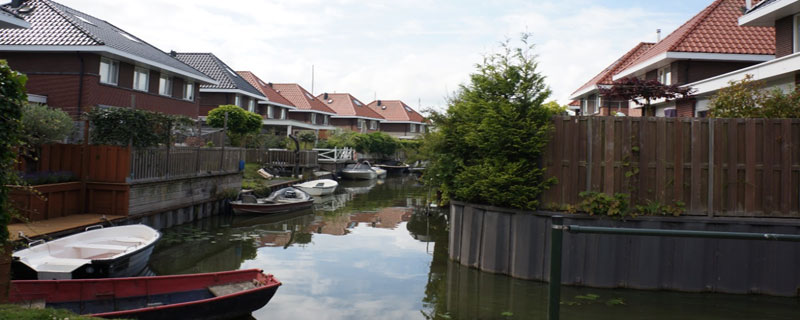The country is not ready for the impact of climate change
Flood resistant homes in the Netherlands
With flooding once again striking many parts of Britain, with thousands of homes and businesses at risk following the latest storms, Justin Meredith, MD of Floodline Consulting, believes the current planning permission policy is fundamentally flawed, and is preventing the construction of flood-resistant homes. He comments: “If Noah were trying to build his Arc today, would he get planning approval? The answer is no, and he would also be also refused should he wish to appeal.”
It can be argued that Noah (Genesis 5:32) was the first to build a flood resilient house due to climate change. Constructed as a land based structure, capable of habitable accommodation and yet able to rise with the predicted flood waters keeping the occupants and building safe at all times.
The Sequential Test flaw: The design or adaptability of a house needs to be taken into account as part of the Sequential Test analysis from the beginning of the planning permission process. It examines whether there are alternative sites at less risk of flooding, and it currently excludes the design features of what is proposed. It is only after passing the sequential test that the design is taken into consideration. There is no science to underpin this analysis, which makes the test subjective and almost impossible to pass if contested. Meredith suggests: “Noah would have been refused permission to build his arc as the planners would have ignored its unique flood-resistant design and would have sought alternative locations on which to build housing,”
Adapt or Die:
The Environment Agency issued a stark warning to the Government in its report, ‘Adapt or Die,’ published 13 October 2021, which stated that: ‘adaptation – becoming resilient to the effects of climate change – is just as vital as mitigation.
“Some 200 people died in this summer’s flooding in Germany. That will happen in this country sooner or later, however high we build our flood defences, unless we also make the places where we live, work and travel resilient to the effects of the more violent weather the climate emergency is bringing. It is adapt or die. … So let’s prepare, act and survive.” And it concludes ‘The country is not ready for the impact of climate change.’
Meredith comments: “This plea appears to be ignored by the Government, as the planning system, which is the key, is positively geared against considering new technologies, and innovative design, such as adaptation, flood proof, or flood resilient design, continue to be resisted.
Meredith continues: “The Government’s white paper ‘Review of Policy for Development in Areas at Flood Risk’ July 2021, does little to provide any confidence that the key policy makers have any understanding of the issues involved, nor an understanding that their policy actively prevents adaptation and innovation.
The solution is simple: The Policy needs to recognise design and the adaptability of that design to account for climate change from the outset of the planning making process. Clear guidance on how to apply an inclusive Sequential Test is required. It is a simple solution to a difficult problem that can be so easily fixed. There is an opportunity for the new housing minister, Stuart Andrew, to demonstrate a clear understanding of the issues and look for solutions which to date the Government have failed to do.
At the moment, for Noah to build his Arc, he had better look to foreign shores.”
Justin Meredith on 07702 218533 or jmeredith@floodlineconsulting.









Leave a Reply
Want to join the discussion?Feel free to contribute!